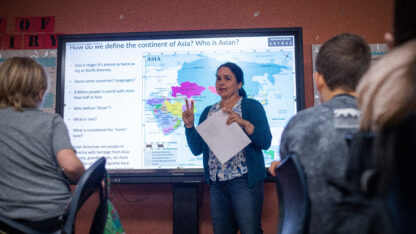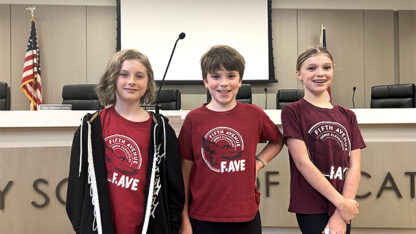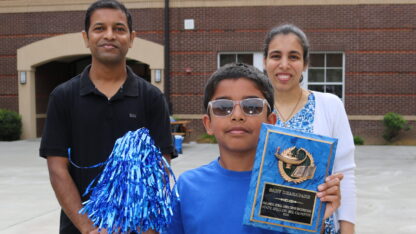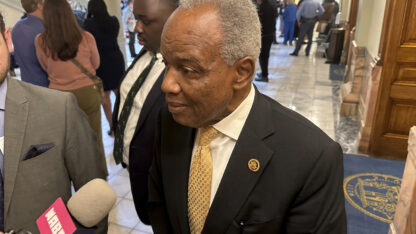Principal Jillian Johnson regularly walks the halls of A.L. Burruss Elementary School in Marietta. The practice is part of her routine – a way to check in on her school family, literally.
Johnson is a parent of two Burruss Beavers: Elizabeth, a third grader, and Caroline, a kindergartner.
She stopped by Caroline’s class earlier this winter to watch her daughter learn to read. Mrs. Lauri Bruton led the lesson.
“[The] beginning of a sentence has to have a…” Bruton asked her class.
“Capital!” the students cheered in unison.
The kindergartners were digging into punctuation, spelling the sentence, “She can snap and skip.”
After sounding out “skip,” Bruton asks the kids how to punctuate the sentence.
“Period!” shouts one student.
“Why?”
“Because [it’s] a telling sentence!”
“It’s a telling sentence! Do you remember that big word we learned? Say it!”
“Declarative!”
Principal Johnson watched quietly from the back of the room with a grin.
A lot of other kindergartners are still learning the alphabet at this age. But not at Burruss.
A few years ago, Johnson and her staff changed how they teach students to read, transitioning from “balanced literacy” to “structured literacy.” The rest of the Marietta school system has done the same.
“We changed every single practice in how we teach children to read,” the Marietta principal noted. “It is a total 180.”
“Our percentage of students reading at or above grade level just continue to climb. And it was stagnant or regressing for years before that.”
Jillian Johnson, principal – A.L. Burruss Elementary School
In balanced literacy, teachers let a child figure things out themselves with context clues.
As Johnson describes it, structured literacy is explicit instruction — the polar opposite.
“[Structured literacy] teach[es] them what the letters mean, and how the letters represent sounds, and how the sounds come together to make words,” she said.
Johnson says the impact of structured literacy at her elementary school has been transformational. Last year, the third graders at Burruss had the second-highest gains in the statewide Georgia Milestones test.
“Our percentage of children reading at or above grade level just continues to climb,” Johnson added. “And it was stagnant–if not regressing–for years before that.”
Third grade is a big year for young readers. Experts call it the year students go from learning-to-read to reading-to-learn. But Johnson says it’s more than just that.
“Their sense of self develops so much,” she said. “It’s really incredible. We’re going through it in my home and then also leading kids through it here at school.”
A.L. Burruss and the Marietta school system inspired state officials.
Last year, the Georgia General Assembly passed a sweeping piece of legislation – House Bill 538 – to make all public schools teach reading the way they do in Marietta.
Marietta City Schools is just one example of why structured literacy works.
Nationally, the state of Mississippi is the gold standard — largely because of Carey Wright, the former state superintendent. In the world of student literacy, she is held in the same esteem as Michael Jordan in the game of basketball.
“We changed every single practice in how we teach children to read. It is a total 180.”
Jillian Johnson, principal – A.L. Burruss Elementary School
Folks call the way that Wright improved reading scores in the Magnolia State the “Mississippi Miracle,” but the acclaimed educator pushes back on that.
“It is not a miracle,” she said. “It is hard work. And it’s hard work over time.”
As Wright reflected on what Mississippi did well, she said coaching teachers in structured literacy was part of a full-court press.
“We had teachers coming out and saying it was the best professional development they’ve ever had,” she said. “It was like an eye opener for some people to know that… there actually is a very strategic way to teach children how to read. And there’s decades of research behind it.”
Teacher professional development is also a big part of Georgia’s game plan.
The Georgia Department of Education (DOE) is training literacy coaches to help districts across the state implement structured literacy.
The implementation of this statewide coaching model is being overseen by J. Nicholas Philmon, who helped create a similar system for the schools in Marietta.
Ramona Brown is also helping to train literacy coaches across the state as the field implementation coordinator for an organization called Cox Campus, which has partnered with the Georgia DOE.
Earlier this year, she led a workshop in Columbus for dozens of literacy coaches, who will then train teachers at the district level.
Brown said the kind of explicit instruction that structured literacy requires works for all kids, including those with learning challenges like dyslexia.
Structured literacy is about equity, she continued.
If we equip [coaches] with the knowledge that we know benefits all children… that’s how we scale the work and that’s how it’s sustained,” she said. “Once [teachers] get a good grasp of it, they start seeing wins.
State lawmakers are eager to see wins too.
When last year’s big literacy bill was passed, it didn’t have any money attached to it.
This year’s budget puts money towards programs like literacy coaches and tests to track student progress. Republican State Senator Billy Hickman has sponsored legislation that would make it easier to do the latter.
“This is not a marathon,” Hickman said at a press conference about the legislation. “This is a 100-yard dash.”
The District 4 senator and other lawmakers have continually pressed the Georgia DOE for results.
However, education officials caution against expecting immediate improvements in student literacy.
“Folks who want to see immediate gains have to [consider if districts] have the resources that they need to implement with the same intensity that Marietta did,” said Ryan Lee-James, chief academic officer at the Rollins Center for Language and Literacy.
“I don’t mean financial resources,” Lee-James continued. “I mean buy-in and expectations from the school board. Buy-in from the superintendent.”
Principal Jillian Johnson at A.L. Burruss said the same.
“I think that the key is leadership,” she said. “That’s my biggest piece of advice to those who are new on the journey. I really have kind of taken it on as a personal mission … and my staff fully understands the assignment.”









